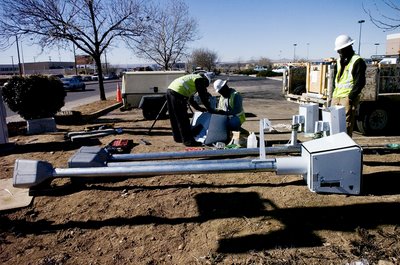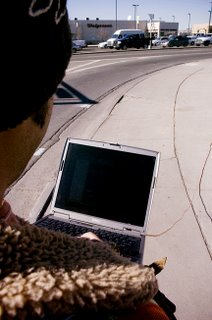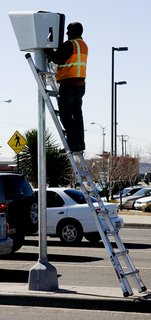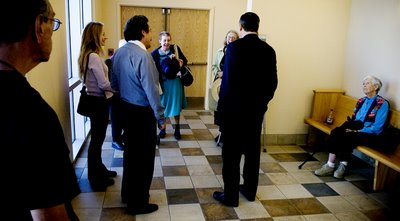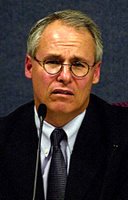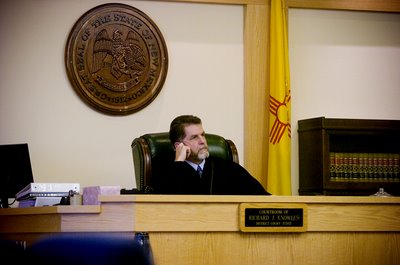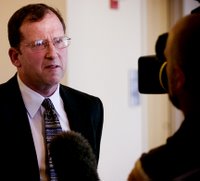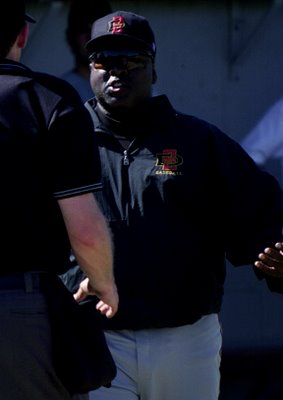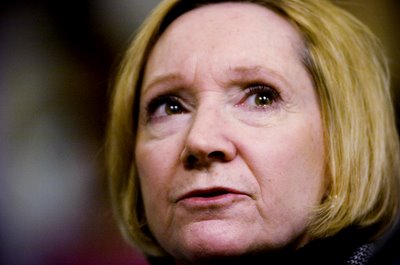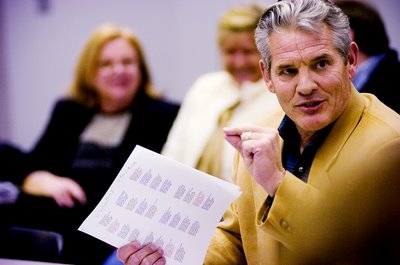What’s Wrong With This Picture?
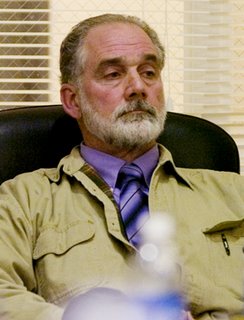
This is Charles “Ched” MacQuigg, 56, a retired shop teacher. He is running for Albuquerque Public Schools Board of Education District 4 position, the University and Downtown areas currently held by outgoing member Leonard J. DeLayo, Jr.
He’s a bit frustrated. He had a dispute with an APS administrator and doesn’t believe he was treated fairly in trying to resolve their differences. He is a regular speaker, during the public forum portion of Board meetings.
However, Board President Paula Maes suspended public forums at the end of the Dec. 6 meeting, as analyzed in my Wed. Dec. 13 posting;
The Face of Censorship!
The topic at that meeting, during the public forum, was particularly worrisome for some members of the Board. The comments surrounded the actions of Rio Grande High School Principal Al Sanchez who took 15-year-old Fidel Maldonado Jr. off school grounds, without parental approval, to his local barber to have the “505” he had sculpted on his otherwise shaved head, removed.

Maldonado Jr., left, is seen with his lawyer Paul Livingston talking with his father Fidel Maldonado Sr. on Dec. 6, 2006.
The Board did not seem disturbed by comments in support of Sanchez. It was comments explaining what Sanchez did wrong or the calling for disciplinary action that upset members.
Board member De Layo objected to hearing comments about a personnel matter that was handled exclusively by the administration.
Sanchez was disciplined. However, APS spokesman Rigo Chavez declined to disclose the action taken, citing personnel privacy rules. Sanchez announced in the press that he was on medical leave from the stress of the events. He returned to his post after some speculation, on his part, that he might not. Whatever disciplinary action was taken, it would not have been considered severe. If the action had included a suspension, it could not have exceeded the time he was absent on what he called sick leave.
Maldonado Jr. has since transferred from Rio Grande and went on to box in his silver glove sanctioning bodies’ regional fights and won his bout over the Jan. 5-7 weekend in California.

MacQuigg, during a discussion at the Jan. 4 Policy Committee Meeting, rose on a point of personal privilege, citing Roberts Rules of Order. He was instantly ruled out of order and APS Police Sgt. Kim Murray stepped forward physically touching MacQuigg several times. Eventually, Murray asked the committee if they wanted MacQuigg ejected.
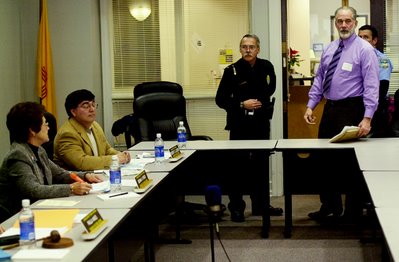
Board member Berna Facio said yes and MacQuigg withdrew.
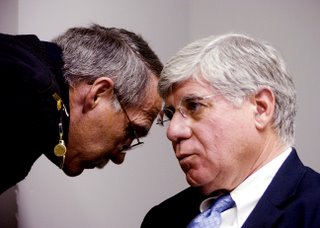
Later, Murray approached the Boards legal advisor, Art Melendres, with a request from MacQuigg to be allowed to return to the room. MacQuigg returned and sat quietly through the remainder of the public forum discussion.
The Policy Committee’s revised agenda had two action items listed: “the recommendation of approval of amendment to Ralph J. Bunche Academy charter” and “Public forum language and procedures.” The Academy was seeking authorization to change its location from God’s Church at Wyoming Boulevard and Phoenix Road N.E. to a site on Yale Boulevard S.E.
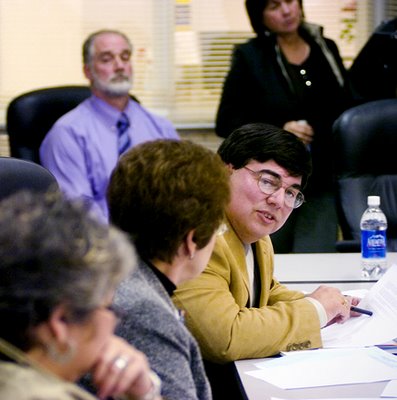
During the committees’ discussion on the Academy’s charter, there was a motion made by Board member Robert Lucero to clarify language including the importance of serving the best interest of both Bunche Academy and the School District. The motion was seconded. Lucero called for the question. Maes took a vote that passed unanimously.
The board moved on to discuss the public forum issue.
The public forum section of the agenda is normally held after the housekeeping items: call to order, roll call, adoption of the agenda, and the reading of the minutes. Regular meetings of the Board are video taped for delayed broadcast on Comcast Cable channel 96. TalNet, or the teach and learn network, is the educational access channel administered by KNME TV 5, http://www.knmetv.org/ which is owned and operated jointly by UNM and APS.
The exclusive cable franchise between the City of Albuquerque and Comcast requires three channels: public, educational and government access. The other two stations are Public access Channel 27, http://www.quote-unquote.org/ and GOV 16, http://www.cabq.gov/govtv/index.html.
Maes said she announced at the Dec. 6 regular meeting of the Board that public forum would be removed from the regular agenda and heard before the meeting so it would not be part of what was televised.
“It is nothing that is set in stone,” Maes said. “If this board would like to go back to having public forum as part of the regular agenda. I mean, it’s amenable to us to go either way. There are a number of County Commissioners and other people do their public forums before the meeting.” It wasn’t to eliminate public forum, just to change its place at meetings, Maes said.

The Board has already placed limits on citizens restricting comments to two minutes and requiring that speakers sign a “Individual’s Request to Speak” card promising to be nice and not attack anybody personally.
“Public forum is not a time for the Board of Education to address the audience or do those type of things,” Lucero, who is Web content administrator for Bernalillo County, said. “So, we do take notes and we listen to our community. I talked to Jeff Landers, for the County (attorney,) they’ve been very successful in how they’ve been working with the public and I just think we’re following the same guidelines that they are and I think it’s a good thing.”
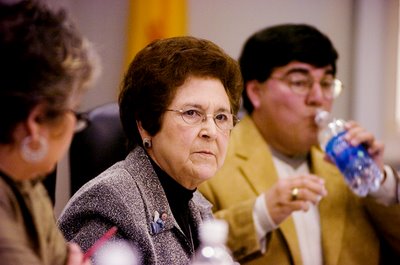
“At the beginning of public forum, we make it very, very, very, very clear that we are not going to respond to any of the comments or requests or demands of the person that is standing up,” Facio said. “It creates an uncomfortable situation.”
“We’re prohibiting people from discussing personnel issues,” Gordon Rowe said. “I understand where we’re coming from on the personnel issues but I also understand that parents, I think, need to have a way and a forum to discuss particular issues they have with particular people in the school district. As I read this right now, we’re having a blanket prohibition. If you don’t like your principal, you’re not to come here and say that.”
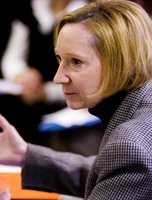
“It makes it very difficult when a principal is maybe going to have some disciplinary action against them that it be discussed publicly,” Superintendent Elizabeth Everitt said. “And that’s our concern. That it has to be fair to the employee that’s involved, whether it’s a principal or a teacher. If there’s some kind of action being taken, personal, personnel comment probably not going to be helpful either way.”
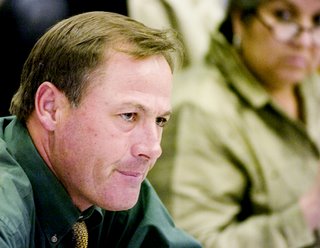
“I think that it might be appropriate to tell people that there could be an aspect of the personnel process where they could show up and give a public comment on a particular person,” Rowe said. “So that they don’t feel that they are disenfranchised with not being able to give their opinion on that. And that way we can say, listen, we don’t deal with this, but we understand you’re very concerned about this particular individual and there is going to be a formal hearing and there is a public forum aspect of that hearing, in which maybe those people could either provide a written or an oral statement. I don’t know, I don’t know how important it is on everybody’s mind is. But I do think that it is important that parents have a right to comment on people who work for the district.”

“I agree with Mr. Rowe, I mean where else are they going to go?” Facio said. “I mean we are, they are our constituents and we’re here to listen. The only thing is, we can’t respond to them. At least we’re aware that there is a concern out there.”
“My recommendation is that we; one, they should tell you individually, because they are your constituents,” Everitt said. “But, I would request that they give the information to the Service Center. We review that information monthly. We look at it as we look at performances at schools. Is there patterns at a school site? It’s really a good safe place to provide information. And then, I think that the principals’ supervisor is the other person that they can contact directly. Anything said in public can jeopardize it. There’s not a public hearing, Mr. Rowe, as such. But there’s a gathering of data that; part of due process procedures.”
“I kind of agree with Gordon though,” Lucero said. “I think we can ask the public not to mention specific names, things of that nature, but when you talk about a principal, or a secretary, or a counselor, whatever, those are general names and they’re not personal attacks,” Lucero said. “And the Board is just here to listen. I guess I don’t have a problem taking, discussing personnel issues.”
“Is it appropriate for us to tell people they’re not allowed to comment on this during public forum, but they are welcome to submit written position that would be included as part of the personnel process?” Rowe asked Melendres. ”And are we allowed to do that? Would that at least give people a way to…”

Melendres interjected by saying, “In the context of drafting language, my suggestion is going to be that we might take a look at the open meetings act, in the language that relates to limited personnel matters, which related specifically to a promotion, or a demotion and so if, in this context, if someone comes here to share their concern generally about the condition of the school or the performance of even the principal, which is not subject to the disciplinary action, or in the way the open meetings act describes, gives you some latitude. The concern I have is, if in fact there is someone subject to a disciplinary proceeding, which is ongoing, we should be cautious about that and not allow that to blossom into a full-blown discussion that would jeopardize the process that is set up. I think we could work with some language along what I’ve heard and make provisions for written comments. And if you would like to defer this to the next Policy Committee meeting, we can submit a draft language to you for your review and consideration.”
The issue was tabled for further debate at the next scheduled Policy Committee meeting, 5:00 p.m. Jan. 18, at the APS DeLayo-Martin Community Room, 6400 Uptown Blvd. N.E.
There were no public comments asked for on the issue.
The Board then immediately went into a Special Board Meeting.
“I need to ask to amend the agenda though to remove the public forum and I need to explain to you why,” Maes said at the beginning of the special board meeting. “During a special meeting, there is not a public forum section. We knew that there needed to be public forum regarding the Ralph Bunche issue. I’m asking you to amend the agenda to remove the public forum from this agenda.”

MacQuigg again rose to express a point of personal privilege. He was again instantly ruled out of order and Sgt. Murray again stepped forward asking the Board if they wanted MacQuigg ejected. MacQuigg was again ejected.

So What’s Wrong With This Picture?
Disclosure: MacQuigg posted comments to this blogspot Dec. 1, about the No Child Left Behind at Highland article and then again Dec. 24 about The Blue Wall: Intimidation and Bullies.
He contacted me Dec. 22 asking to communicate directly. “I’m wondering why you are not more interested in the aps accountability issue?” He wrote, “I do not want, nor will I solicit, accept, or represent that support for the issue reflects support for me or my candidacy, in any manner.”
We then exchanged a number of e-mails. I am interested in the issue of MacQuigg’s right to speak at public forums and to confront the board. However, I don’t make an endorsement of MacQuigg’s candidacy. He has his own blogspot: Diogenes’ Six, http://ched-macquigg.blogspot.com/.
The original Diogenes was reported to wander the streets of ancient Athens, holding a torch looking for an honest man, but finding only scoundrels and rascals.

I would normally direct you to TalNet on Comcast Cable channel 96, to view this meeting, but there were no cameras present. It raises several issues: It is the practice of APS to broadcast videotaped meetings of the Board. There is a legal theory that a repeated practice becomes policy.
The whole point of moving the public forum away from the meeting to before it begins is to keep the television audience from viewing what the public says to the Board.
Critics speculate that the Board’s action is, at least in part, an attempt to keep what they see as gadflies from using the televised forum to espouse personal political theories and ramblings. Several local governmental entities including the County Commission and City Council have used a variety of methods to limit some individuals’ access to being seen on the government channel. It seems to be specifically aimed at Geraldine Amato and her followers. MacQuigg has become particularly bothersome to the Board, though they have not mentioned any names.
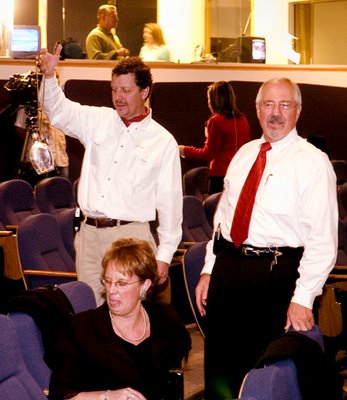
County employees Paul Evans and Sherri Olsen, who work in the Public Information Office, are seen with Deputy County Manager John Dantis, right; expressing disdain for Amato on election night in the County Commission/City Council chambers, when they passed around a bottle of water she had left from the City Council meeting the night before. It seems the greatest contempt for those who make public comments comes from public employees and elected officials.

There was a regular board meeting scheduled for Wed., Jan. 3, that was cancelled. The special Board meeting the next day was tacked on after the Policy Committee meeting.
One cannot tell when a scheduled meeting is posted because APS does not make note of that on the agenda. What is so weird about this day’s meetings is that the Policy Committee meeting was followed immediately by a special Board of Education meeting. The special meeting was not declared as an emergency as required by the Open Meetings Act. It appears that the Bunche Academy charter amendment was a predetermined issue because there was no time between meetings for public consideration of events.
The point is that when Lucero called the question, it was for the language amendment to the issue that was on the floor. The unanimous vote was only to that amendment. There was no other vote. The issue of the Amendment to Ralph J. Bunche Academy’s charter was not voted upon. Therefore, when the motion to accept the committee’s recommendation was voted upon, they actually had no issue before them, though everyone in the room thought they did. I approached the clerk after the meeting to point this out. She checked her notes and realized that she had only recorded one vote and agreed that it had to have been for the Lucero amendment.
I would have spoken out at the time, that Maes moved on without having taken a vote on the Bunche issue, except because of how she had handled MacQuigg. I didn’t wish to suffer the same fate by taking on this issue at that moment.
Does this mean anything? Yes, the moving of the Bunche Academy charter school is not a legal act. Will anything happen to correct this? I doubt it. What does it mean? It is another example of the ineptness, incompetence and even a form of intellectual corruption on the part of the APS Board!
As a citizen, I could not distinguish which members of the Board were assigned as members of the Policy Committee. Clearly, Maes chaired the committee. The Board’s rule makes the chairs of the Capital Outlay and Technology, Finance, and District Relations Committees, members of the Policy Committee. I don’t know who the chairs are because the agenda does not identify them.
This seems in conflict with the board’s rules on the make-up of the Policy Committee.
“B.07 Board Committees
The Board of Education may establish standing committees. Each standing committee will consist of at least three (3) Board members with a chairperson elected by the Board at the first Regular Board meeting held in March.
Members of Standing Committees, except as noted for the Audit and Policy Committees, will be appointed by the President, with concurrence and confirmation by the Board, no later than the second Regular Board meeting in March. The Board members will be the voting members of the committees, and the Superintendent or the Superintendent’s designee(s) will serve as non-voting members of the committees. All meetings of Board committees will be publicly announced and will adhere to the Open Meetings Act. The public will be encouraged to attend, with the exception of the Audit Committee.
The Board has established the following standing committees:
…B. A Policy Committee to provide oversight for the legal, financial, and academic policies of the District; to review and recommend to the Board annual approval of the District’s Five-Year Strategic Instructional Master Plan, Student Behavior Handbook, and the District’s overall academic policy; to establish the relationship between the other Standing Committees and the vision and mission of the District; and, to forward to the Board a recommendation regarding the District’s bond and mill levy election requirements. The Policy Committee will be comprised of the Chairs of the Capital Outlay and Technology, Finance, and District Relations Committees. A Board member who does not serve as Chair of one of the other Standing Committees or as an Officer will be eligible to chair the Committee.”
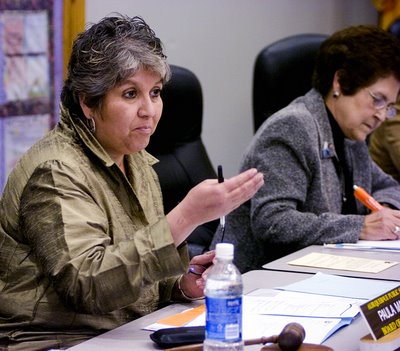
Clearly, as an officer of the Board, President Maes may not, by rule, serve as chairman of the Policy Committee.

Other board members in attendance were: Facio, Lucero, Rowe and Mary Lee Martin, who called in by telephone from out of town. DeLayo and Miguel Acosta were not present.
It is inappropriate for non-committee Board members to sit on the dais and even more inappropriate for them to join the discussion. Ultimately, it is just wrong for non-committee Board members to register a vote with the committee.
The Board misses the point of the public comments portion of their meetings and confuses the right of their constituents to express their concerns with other aspects of the administrative procedures related to personnel matters.
Sanchez, and any other school employee who is a subject of discipline, are entitled to a due process hearing. Under the State’s School Personnel Act, hearings are subject to the provisions of the Open Meetings Act. Under the Open Meetings Act, a personnel hearing may be closed, but if the employee wants the hearing open, it should be.
Many governmental bodies try to use the Open Meetings Act exception, allowing closed sessions for "limited personnel matters," to hide what they are doing with an employee’ to protect themselves, not the employees’ rights to privacy.

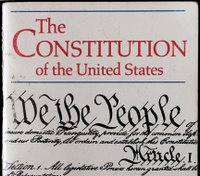
The First Amendment of the Constitution of the United States, “Congress shall make no law respecting an establishment of religion, or prohibiting the free exercise thereof; or abridging the freedom of speech, or of the press; or the right of the people peaceably to assemble, and petition the Government for a redress of grievances.”
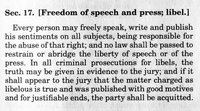
Sec. 17, of the State of New Mexico’s Constitution: Freedom of speech and press; libel, “Every person may freely speak, write and publish his sentiments on all subjects, being responsible for the abuse of that right; and no law shall be passed to restrain or abridge the liberty of speech or of the press. In all criminal prosecutions for libels, the truth may be given in evidence to the jury; and if it shall appear to the jury that the matter charged as libelous is true and was published with good motives and for justifiable ends, the party shall be acquitted.”

Both Constitutions take precedence over the meager attempts of this board to limit or prohibit citizens from saying anything they wish in the governmental setting.
What is the Executive Committee that Maes alluded to, that approved the removal of public forums from APS Board meetings? Who’s on it? The public cannot find out through the APS Website. They may have met, but they don’t publish or post an agenda and are not listed in the rule establishing standing committees.
The State’s Open Meetings Act prohibits an organization covered by it, from forming into smaller groups, like committees, to avoid the requirements of the Act. It appears that the “Executive Committee,” if it exists, violates the Open Meetings Act.
Further, the Board has it own rule, under “Section B – School Board Governance and Operations, B.10 Public Participation at Board Meetings,” would, through the Open Meetings Act, apply equally to all meetings including committees and subcommittees.
The language of B.10 reads: “The Board shall provide an opportunity for citizens to be heard regarding their concerns, complaints, or commendations during public forum at each regular meeting of the Board of Education. Individuals may request to speak by signing a ‘Individual’s Request to Speak’ card prior to the start time of the regular Board of Education meeting and subsequently being recognized by the Secretary of the Board.
The time allotted each individual or organization for presentation shall be limited to two (2) minutes each. A speaker may not yield unused time to another person. The total time for hearing of citizens shall be no more than thirty (30) minutes at any one meeting unless an extension of time is allowed by the President of the Board.
Complaints about individual employees will not be heard.”
This rule on its face is in conflict with both Constitutions and the Open Meetings Act. However, it does require public forum at each regular meeting of the Board of Education and allows “citizens to be heard regarding their concerns, complaints, or commendations.”
The Open Meetings Act § 10-15-1. Formation of public policy; procedures for open meetings; exceptions and procedures for closed meetings reads:
“ A. In recognition of the fact that a representative government is dependent upon an informed electorate, it is declared to be public policy of this state that all persons are entitled to the greatest possible information regarding the affairs of government and the official acts of those officers and employees who represent them. The formation of public policy or the conduct of business by vote shall not be conducted in closed meeting. All meetings of any public body except the legislature and the courts shall be public meetings, and all persons so desiring shall be permitted to attend and listen to the deliberations and proceedings. Reasonable efforts shall be made to accommodate the use of audio and video recording devices.
B. All meetings of a quorum of members of any board, commission, administrative adjudicatory body or other policymaking body of any state agency, any agency or authority of any county, municipality, district or any political subdivision, held for the purpose of formulating public policy, including the development of personnel policy, rules, regulations or ordinances, discussing public business or for the purpose of taking any action within the authority of or the delegated authority of any board, commission or other policymaking body are declared to be public meetings open to the public at all times, except as otherwise provided in the constitution of New Mexico or the Open Meetings Act [Chapter 10, Article 15 NMSA 1978]. No public meeting once convened that is otherwise required to be open pursuant to the Open Meetings Act shall be closed or dissolved into small groups or committees for the purpose of permitting the closing of the meeting.
…H. The provisions of Subsections A, B and G of this section do not apply to:
(1) meetings pertaining to issuance, suspension, renewal or revocation of a license, except that a hearing at which evidence is offered or rebutted shall be open. All final actions on the issuance, suspension, renewal or revocation of a license shall be taken at an open meeting;
(2) limited personnel matters; provided that for purposes of the Open Meetings Act [Chapter 10, Article 15 NMSA 1978], "limited personnel matters" means the discussion of hiring, promotion, demotion, dismissal, assignment or resignation of or the investigation or consideration of complaints or charges against any individual public employee; provided further that this subsection is not to be construed as to exempt final actions on personnel from being taken at open public meetings, nor does it preclude an aggrieved public employee from demanding a public hearing.
Judicial candidates interviewed by any commission shall have the right to demand an open interview;
(3) deliberations by a public body in connection with an administrative adjudicatory proceeding. For purposes of this paragraph, an "administrative adjudicatory proceeding" means a proceeding brought by or against a person before a public body in which individual legal rights, duties or privileges are required by law to be determined by the public body after an opportunity for a trial-type hearing. Except as otherwise provided in this section, the actual administrative adjudicatory proceeding at which evidence is offered or rebutted and any final action taken as a result of the proceeding shall occur in an open meeting;
(4) the discussion of personally identifiable information about any individual student, unless the student, his parent or guardian requests otherwise;”
The point is that if the Board meets, as it now proposes hearing public forum before regular Board meetings, the public forum is also, in its own right, a meeting and is subject to all the requirements of the Open Meetings Act. But more importantly, any meeting of the Board, no matter how big or small is subject to its own rules on public participation, not withstanding the language limiting public forum to regular Board meetings.
The Open Meetings Act requires that “…all persons are entitled to the greatest possible information regarding the affairs of government and the official acts of those officers and employees who represent them.”
Televising public forums, as was the established practice, meets the minimal requirement to reach all persons desiring to observe the meetings, whether in the room or not.

As to the question of compromising a personnel hearing by allowing citizen comment during the public forum; two thoughts:
As the Board is quick to point out, they have no part in the administrative personnel process. Listening to the citizenry is one of their duties, whether they like or agree with what is said, or even how it is said.
Allowing either an oral or written statement in the personnel process is where the compromising effect is possible. The employee is entitled to a fair hearing. Allowing extraneous opinion, not directly related to the facts of the inquiry, is where an oral or written statement could compromise the proceeding. A public comment during public forum does not.
Instead of trying to quash public comments, the board should relax, sit back and listen. The requirement of having to fill out the "Individual’s Request to Speak" card smacks of autocratic rule and is therefore undemocratic. The governmental body may not attempt to restrict either language or content!
The Board should let any member of the public come forward when the public forum is open, at its appropriate place during the meeting, or when the Board takes comments on a particular issue without trying to control what is said. Citizens should be able to simply get in a queue before the last speaker is finished and be allowed to express themselves.
Any concern that a Board member might have in protecting a public employee’s rights and reputation are adequately covered by criminal libel and slander laws and civilly through defamation suits.

MacQuigg handed out a handbill quoting Roberts Rules of Order on personal privilege to people attending the meeting.

My first thought was that MacQuigg was using one of the most powerful sections of Roberts. Then I thought, how could he insinuate himself into the elected board? Roberts applies to the elected Board because it has a rule, B.14 Parliamentary Authority, “Roberts' Rules of Order, newly revised, will govern the Board of Education, except when state regulations prevail. Although most items are handled by appropriate motion procedures, consensus action is also used. Actual procedures will be left to the discretion of the Board president.” However, MacQuigg, not being an elected member, would not have any standing, except that the Board has a rule:
B.09 Board Agenda, “Board of Education meeting agendas are set by the Board president and the Superintendent. The Board reserves the right to delete items at the meeting that are from persons other than Board Members. A written request that an item be included on the agenda must be filed in the Board office at least seven (7) calendar days prior to the publication of the agenda. Such requests must include in writing, all statements and materials the person anticipates presenting.
Employee organization representatives and members within employee units must follow their respective written agreements or handbook of policies prior to requesting to be heard by the Board.”
What this means, is that if MacQuigg filed a written request to have an item included on the agenda, and the Board deleted his item at the meeting, then his use of the point of personal privilege would be proper. In making his point, MacQuigg would be able to express the reason, thereby, his argument. A point of personal privilege is never out of order. He had a right to challenge the attempt to remove public forum from the agenda because it affected his right to participate in the meeting under that section.

When Sgt. Murray touched MacQuigg, it might have constituted an unlawful arrest or even a battery.

Murray stepped forward in anticipation of taking action against MacQuigg. However, he asked the Board for direction, yet by state law the Board has no power to order or ask the officer to remove someone they feel is disrupting their meeting.
State law section 30-20-13: Interference with members of staff, public officials or the general public; trespass; damage to property; misdemeanors; penalties.
“C. No person shall willfully refuse or fail to leave the property of or any building or other facility owned, operated or controlled by the state or any of its political subdivisions when requested to do so by a lawful custodian of the building, facility or property if the person is committing, threatens to commit or incites others to commit any act which would disrupt, impair, interfere with or obstruct the lawful mission, processes, procedures or functions of the property, building or facility.
E. Nothing in this section shall be construed to prevent lawful assembly and peaceful and orderly petition for the redress of grievances, including any labor dispute.”
The Board doesn’t seem to understand the law. Clearly they do not recognize “lawful assembly and peaceful and orderly petition for the redress of grievances.”
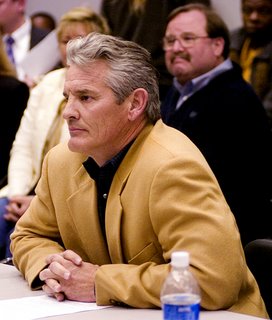
I’ve seen an awful lot of disorderly conduct in my years, but MacQuigg’s conduct was nothing but peaceful and orderly. His efforts were to petition a governmental body that has eliminated the process to do so. However, if the Board determines that they wish to remove a disruptive person, they may not legally ask the officer. They are required to seek out the lawful custodian of the building. There were at least two people in the room who legally qualified: Superintendent Everitt and APS Executive Director for Facilities and Support Operations Bradley Winter.
There was one very disturbing aspect that I caught with my camera. Murray was baiting MacQuigg to try to get him to respond in a manner that Murray could then use as an excuse to arrest MacQuigg for disorderly conduct. MacQuigg did not make any aggressive gesture. However, he told Murray to take his hands off of him. MacQuigg turned towards Murray but did not square off, and most telling, he kept his hands down and open. Murray comes off as a bully.
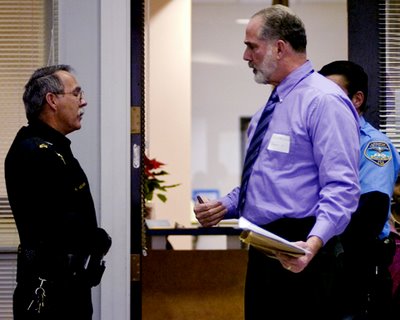
“Is he still here,” Maes asked Murray after the meeting, about MacQuigg’s presence. Murray indicated MacQuigg had left. Murray offered to escort both Maes and Everitt to their vehicles. The Superintendent declined; Maes accepted. Their greatest threat was slipping on the ice, according to Everitt, as she carefully made her way to her vehicle.

It seems to me that elected officials create situations of antagonism with constituents and then fear them. Facio said, “It creates an uncomfortable situation,” and Maes’ seemingly physical fear of MacQuigg are such examples.
Democracy is not a pretty process, nor it seems should it be for the timid or fainthearted. These elected officials may appear unqualified to serve in the public’s trust.
I now understand why students fail to perform as well as expected on standardized tests; the leadership, at the highest levels, doesn’t know any better themselves. If the Board can’t read, write, speak or understand the English language enough to comply with the simplest precepts of civics and laws, the students are doomed!
 This is Michael Brasher taking the oath of office as a City Councillor, Dec. 1, 1997. His wife Jorja, a city employee in the Family and Community Services Department, holds the family Bible, while District Court Judge Theresa Baca administers the oath.
This is Michael Brasher taking the oath of office as a City Councillor, Dec. 1, 1997. His wife Jorja, a city employee in the Family and Community Services Department, holds the family Bible, while District Court Judge Theresa Baca administers the oath.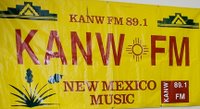 Brasher is the manager of KANW FM 89.1, http://www.kanw.com/ that is owned and operated by the Albuquerque Public Schools. He has more than 25 years of broadcasting experience.
Brasher is the manager of KANW FM 89.1, http://www.kanw.com/ that is owned and operated by the Albuquerque Public Schools. He has more than 25 years of broadcasting experience.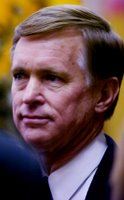 If what I wrote upset Brasher, I apologize to him. His concern calls for some clarifications.
If what I wrote upset Brasher, I apologize to him. His concern calls for some clarifications.  I accept Brasher’s statement that he recused himself from those issues involving his wife’s department. I did however, observe Brasher vote on the entire budget that included the Family and Community Services’ budget. He also voted on APS issues.
I accept Brasher’s statement that he recused himself from those issues involving his wife’s department. I did however, observe Brasher vote on the entire budget that included the Family and Community Services’ budget. He also voted on APS issues. 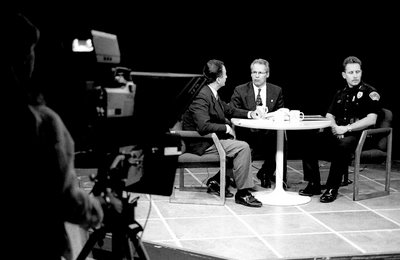 In Sept. 1995, Mayor Martin Chávez, seen here center with City Councillor Steve Gallegos, left and Chief of Police Joe Polisar, used his call in program “Mayor's Open Line” on GOV Cable 14 CCA-TV to encourage viewers to vote for an upcoming quarter cent Public Safety and Community Policing Tax.
In Sept. 1995, Mayor Martin Chávez, seen here center with City Councillor Steve Gallegos, left and Chief of Police Joe Polisar, used his call in program “Mayor's Open Line” on GOV Cable 14 CCA-TV to encourage viewers to vote for an upcoming quarter cent Public Safety and Community Policing Tax. Commissioner Brasher is seen here, left, speaking as a private citizen, during the recent City Council discussion about the proposed downtown streetcar project that would to run along Central Avenue, with a spur to the Sunport, on Nov. 6, 2006. As a former City Councillor, he supported the original 1999 tax plan; he is holding an example of what a governmental project proposal looks like. He challenged the members of the council to delay passing an extension of the current quarter cent transportation infrastructure tax and called for an extensive study before proceeding.
Commissioner Brasher is seen here, left, speaking as a private citizen, during the recent City Council discussion about the proposed downtown streetcar project that would to run along Central Avenue, with a spur to the Sunport, on Nov. 6, 2006. As a former City Councillor, he supported the original 1999 tax plan; he is holding an example of what a governmental project proposal looks like. He challenged the members of the council to delay passing an extension of the current quarter cent transportation infrastructure tax and called for an extensive study before proceeding.